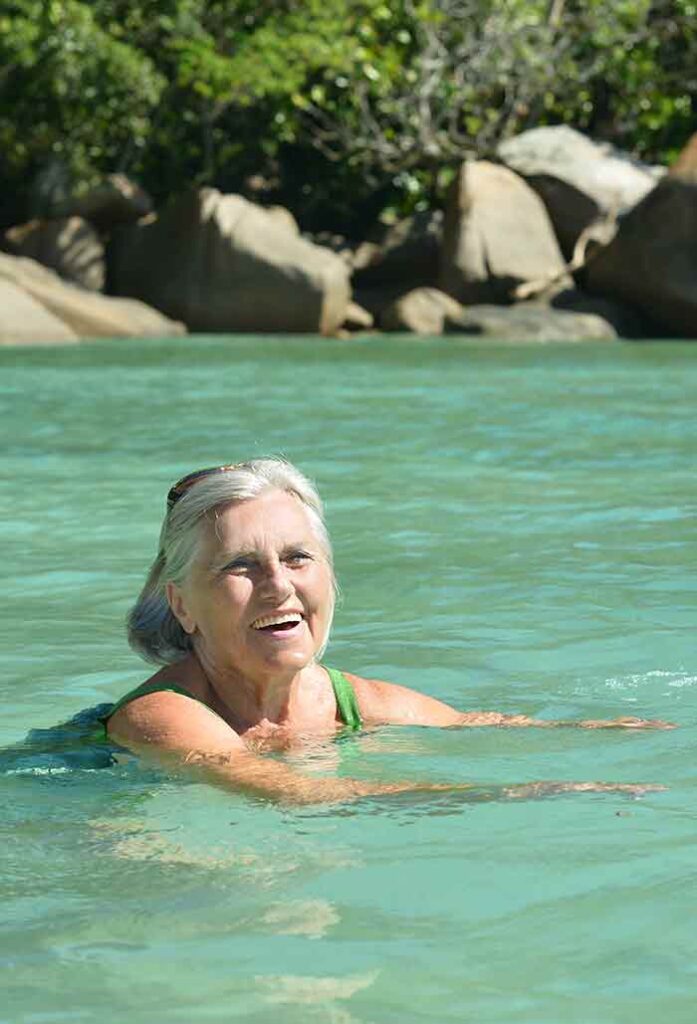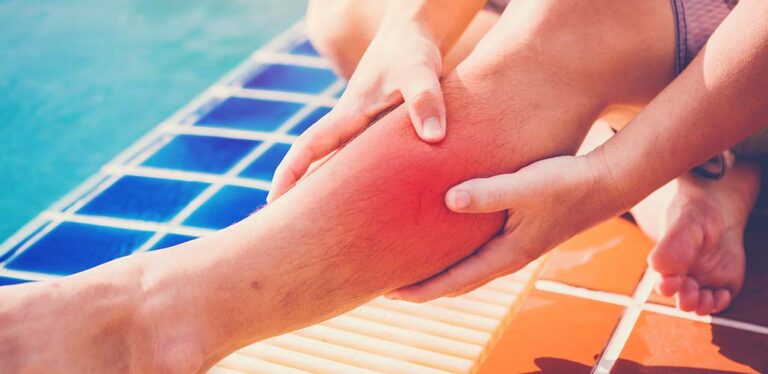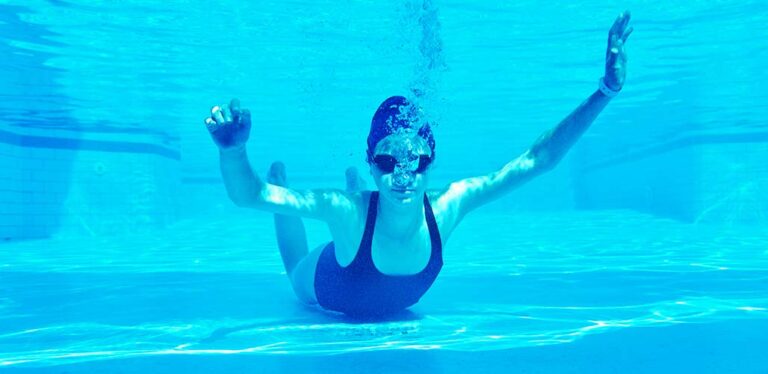Do Swimmers Age Slower?
On my local beach senior citizens, some in their eighties or older, can be seen each morning heading for the waves. And they don’t confine their visits to fine weather. Ultra cold water swimming is popular with seniors too!
So, is there a link between swimming and longevity, do swimmers age more slowly and stay fit for longer? Or is there something about swimming that makes it naturally appealing to older people?
Contents
- Scientific evidence for slower ageing in swimmers
- How swimming improves health in older people
- Risks of swimming for seniors
- Staying safe in the water
I’ll be looking at the evidence that swimming can actually slow down the ageing process and at the benefits and risks for older swimmers of taking to the water on a regular basis.
Scientific evidence for slower ageing in swimmers
One of the most appealing aspects of swimming is its inclusivity. People of any age can swim and many people with disabilities, or health issues that cause pain on weight bearing, can benefit from the support that water offers to our bodies.
Many of those that swim regularly feel healthier and happier for it, but is their perception that swimming keeps them young supported by the science? The answer is both yes, and no. Let’s investigate!
Telomeres and ageing
Scientists are interested in the link between telomeres and ageing. Telomeres are chunks of repeating DNA found at the end of each of our chromosomes. The length of our telomeres is known to be associated with ageing. Short telomeres indicate more cellular ageing, and longer telomeres indicate more youthful cells in your body.
Research has shown that physical activity, such as running, is associated with longer telomeres. However, that does not mean that physical activity necessarily causes those longer telomeres, or that more is always better. One study for example found that elite swimmers had shorter telomeres than recreationally active swimmers, so there may be a point when pushing your body even further does more harm than good. At least where telomeres are concerned.
There is still more work to be done in this field, to establish cause and effect, and to figure out the levels of exercise that is most beneficial.
How swimming improves health in older people
Maintaining good cardiovascular health is a great way to improve quality and potentially length of life too.
Swimming is one of many ways to exercise your heart and lungs. And because it avoids putting pressure on joints, swimming may be a better exercise option for some older adults than walking or running.
Swimming and bone health
Many older adults suffer from reduced bone density, a condition known as osteoporosis which increases the risk of fractures.
Lost bone density is why seniors are more likely to break a bone when they fall. Someone who already suffers from osteoporosis may be able to reduce the risk of injury by exercising in the water.
However, it’s worth considering that weight bearing exercises on land, may help to increase bone density. So if you are in good health at the moment, you might want to include some sessions in the gym into your exercise routine.
How swimming influences cognitive function in older adults
A study carried out in 2012 looked at the effect of regular swimming on the performance of older adults using a range of tests.
These were tests of cognitive ability including reaction times, cognitive flexibility, and working memory. There were ten tests in all, and three groups of people taking part were: 1.young adults, 2. sedentary older adults, and 3. older adults that swam regularly

As might be expected, the young adults beat both groups of older adults in these tests, but the swimmers outperformed the sedentary older adults on several of the tasks that did not include information processing speed.
The researchers concluded that there were some aspects of our cognitive function (five out of the eight executive functioning tasks) that are improved in older adults that swim regularly.
If we add that to our (possibly) longer telomeres, it’s looking good for swimming as a way to age more slowly. But that is not the whole story. There are some risks to swimming for older adults that we need to consider.
Risks of swimming in older adults
Immersing your body in water has distinct effects on your physiology. Being immersed in water is not just a benign thing.
Water pressure acts to shift blood from the outer periphery of your body into your thoracic core, that’s the central part of your chest area that houses your heart and lungs. And when you are immersed in water, your heart has to work harder than it would on dry land.
This isn’t a problem for a young, healthy adult, or for many older healthy adults. But it could be a problem for someone with heart condition. Lisa Purcell from the British Heart Foundation stresses the importance of talking to your doctor before taking up swimming.
We can’t talk about the risks of swimming without mentioning the risk of drowning. Every year keen swimmers drown in circumstances that could have been avoided. The last thing you want to do is add your name to that sad list.
As we age we are more prone to health issues, some of which we may be unaware of. The problem with swimming is that if you are taken ill in deep water, you are in a lot more trouble than if you are on dry land. And it’s harder for bystanders (if there are any) to help you.
If you love swimming, or if it’s the only kind of exercise that suits you, then don’t let any risks put you off swimming altogether. Just take some sensible precautions, so that you can stay safe in the water as you age.
Staying safe in the water as you age
Getting a check up from a doctor before you take the plunge is a great idea. Especially if you haven’t swum for a while, or if you have been unwell, or if you’ve noticed any changes in your body that might indicate a problem.
The golden rule of swimming safely is never to swim alone. This applies at any age of course, but is especially important for the very young, and for those of us entering our senior years.
As with all exercise little and often is much safer than a once a week marathon. If you are lucky enough to have access to a local pool, don’t miss the opportunity.
The link between swimming and longevity
We’ve looked at a few studies that explored the links between swimming and health in older people. The results are mixed and interesting.
- Swimming (not excessively) may be associated with longer telomeres which are associated with longevity. Though one doesn’t necessarily cause the other.
- Swimming can improve cardiovascular health in older adults, though its not the only, or necessarily the best, way to do that.
- Swimming may have risks for people with heart conditions and other health issues.
- Swimming can reduce the risk of injury during exercise
- Swimming may improve some aspects of cognitive function in seniors.
Personally I like the last one of those best of all. But to be fair, the study did not compare with seniors engaging in a different physical activity. Indeed most of the evidence that swimming is good for us, is not really specific to swimming.
It’s about keeping active, and the best way to do that is to engage in a physical activity that you enjoy and can keep up on a regular basis.
No doubt more research will help clarify some of these issues.
In the meantime, if swimming is your thing, a daily dip will make you feel a million dollars. And with luck and a regular routine, you should be able to keep swimming for many years to come.







